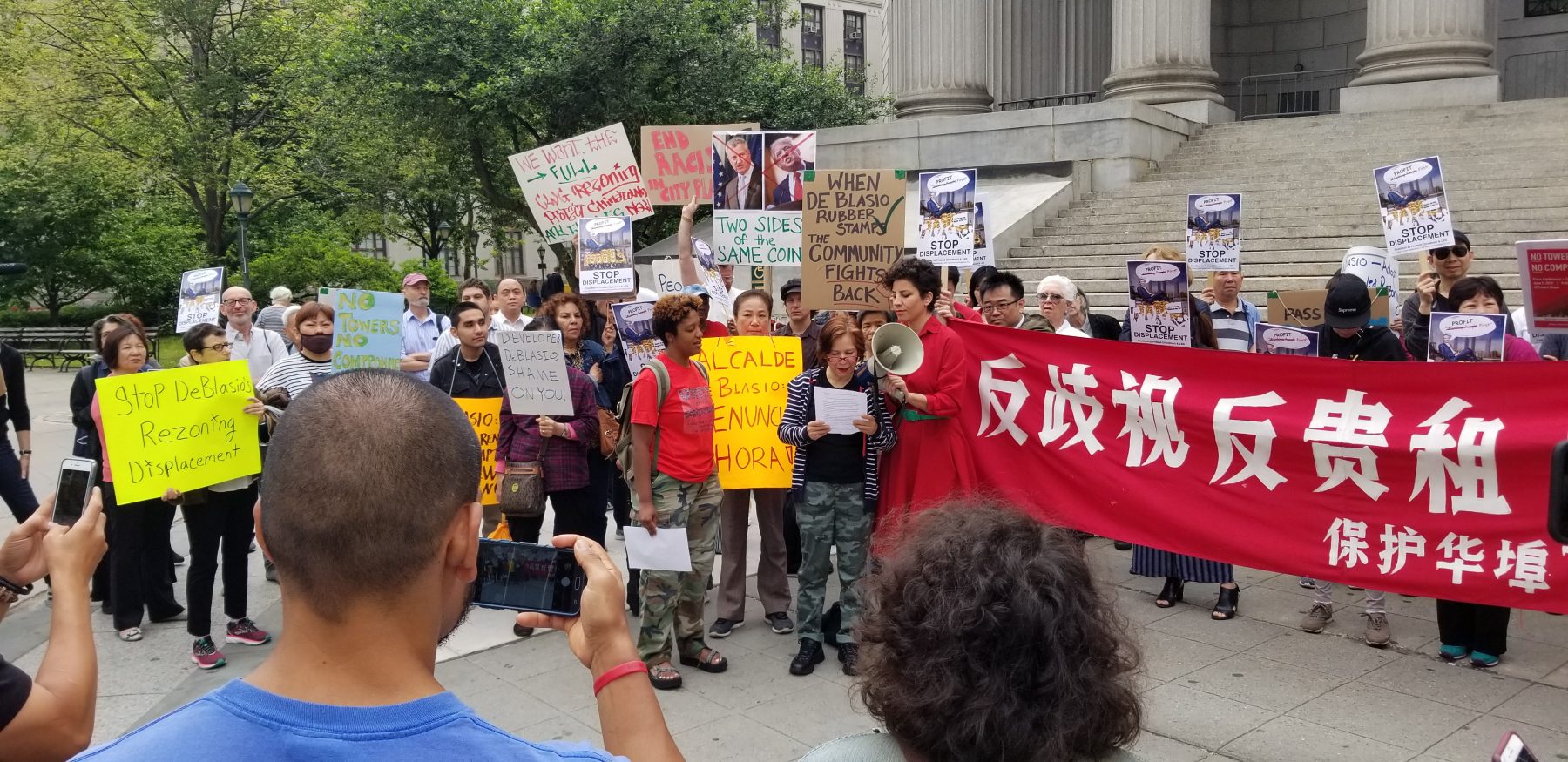Warning: Undefined array key "sharing_networks_networks_sorting" in /var/www/wp-content/plugins/monarch/monarch.php on line 3904
Warning: Trying to access array offset on value of type null in /var/www/wp-content/plugins/monarch/monarch.php on line 3904
Dozens of supporters gathered outside of the New York County Courthouse Wednesday morning ahead of a hearing to halt the construction of four new towers in the Two Bridges area of Manhattan. Speakers raised concerns ranging from traffic increases to environmental impacts, and a fear that the towers would speed up gentrification in a diverse lower-to-middle-class neighborhood.
Organized by the Chinatown Working Group, the press conference supported a lawsuit by the Lower East Side Organized Neighbors (LESON). Their suit is one of four seeking to halt the construction. It was one of three heard in court on Wednesday. One of two which sought to stop the development plan altogether. Supporters of the other suit, brought by the Tenants United Fighting For the Lower East Side (TUFF-LES), attended another rally down the street. Emotions were high, with chants of “No towers, no compromise” from attendees and organizers.

“This is not only a problem of the Lower East Side,” Arnette Scott, one of the plaintiffs, told the crowd, “It’s a problem in New York City. We didn’t come here just to complain. We didn’t come here to tell you that we can’t breathe. We didn’t come here to tell you that food is scarce. We didn’t come here to tell you that displacements were rapid. We came here to tell you we are fighting this.”
The highest profile of the three suits was that of the City Council, led by City Council Member and Manhattan Borough President Gale Brewer, against the city and the Two Bridges developers. The suit alleges that de Blasio and the developers illegally ignored the Uniform Land Use Review Procedure, which is under the purview of the City Council. The mayor’s office approved the construction for the towers, the tallest of which exceeds 1000 feet, saying that the required changes to zoning policy constituted “minor modifications.”
LESON, on the other hand, hopes for a broader ruling. The Chinatown Working Group introduced a plan for a new zoning district, the Chinatown and Lower East River District. The goal of the zoning district is to protect the residents of Two Bridges, primarily Chinese, Latinx, and African American, from gentrification, excessive rent increases, and other threats to a neighborhood which has acted as a haven for low-income families and new immigrants.
The developers in the case are JDS Development Group, a joint venture of L+M Development Partners and CIM Group, and Starrett Development. In a statement before the ruling, a spokesperson for the developers referred to the lawsuits as “wholly without merit,” citing extensive community consultation, public review, and environmental analysis. “At a moment when projects that stand to deliver tens of thousands of jobs and hundreds of millions in community investment are being opposed by anti-development sentiment across the city, it’s important to remember that those actions are not without direct consequences for the communities that stand to benefit.”
In what some saw as a surprising turn of events, State Supreme Court Judge Arthur Engoron chose to reserve judgment. Instead, he extended a temporary restraining order on the development into early August. “These are huge towers,” he said. “I’ve lived in the city my whole life. You can’t just do this because the zoning allows it. I just can’t believe this is the case.”
The halt will last until August 2nd, at which time he will make a final decision. The outcome is uncertain, but representatives for LESON are hopeful about the eventual outcome. “We see (the ruling) as a positive,” says Tony Queylin, a member of LESON and one of their suits’s plaintiffs, “and that gives us more time to build our momentum and our strength because what we’re doing is we’re just getting more people that know about what’s going on.”
A spokesman for the city’s Law Department responded to the decision, saying, “We are disappointed with this ruling. We respectfully disagree with the court’s preliminary findings. The approvals made by the City were appropriate, and we will continue to defend against the claims challenging these important projects.”
Queylin is hopeful that growing support could push approval of the CWG zoning plan. “Our strength lies in the people and the neighborhood and the community,” he says, “They might have a lot of money, but we have the people on our side.”

